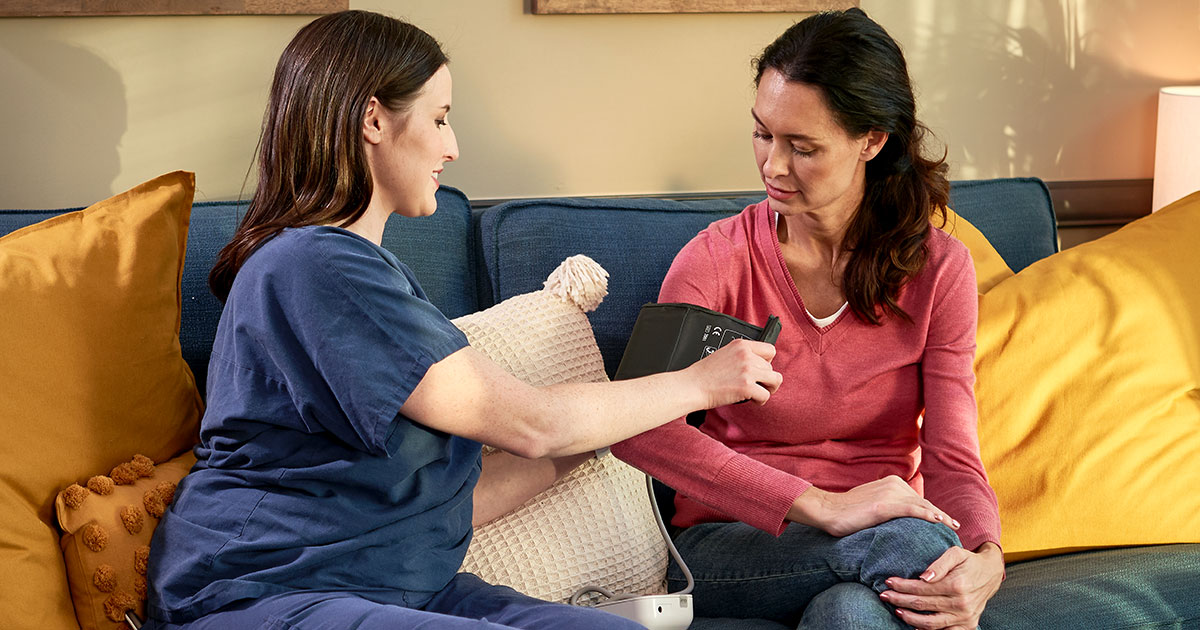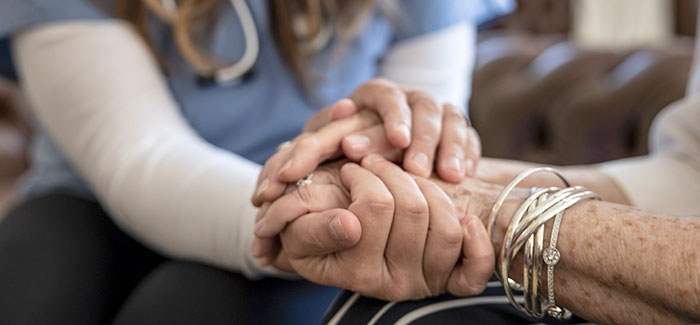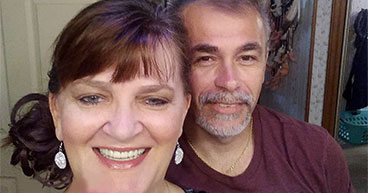
Many cancer patients are fortunate to have family and friends living nearby who can perform caregiving duties during their recovery from treatment. But if your family lives far away or has full-time work and family commitments, they may not be able to give the care you need.
Patients who are weak from chemotherapy may need help preparing meals, doing laundry, running errands and getting to follow-up appointments. Those who have undergone complex surgical procedures may require more extensive care, such as help with bathing, getting to the bathroom and changing wound dressings.
Even if you don’t need 24/7 care, depending on friends and family may take an emotional toll on you and them. Hiring a professional caregiver may help prevent you from feeling like a burden while enabling you to preserve your relationships with your loved ones.
“It may seem counter-intuitive, but hiring a professional caregiver gives patients more independence, not less,” says Amanda Pate, MSN, RN-BC, OCN, Nurse Manager of Clinical Operations and Continuous Care at City of Hope Atlanta. “Patients and family caregivers should talk to their cancer care team and come to an agreement about the types of professional care that would most benefit the patient, based on his or her specific needs.
“Having a plan in place and the appropriate cancer caregivers scheduled before the patient is released from the hospital removes a lot of stress,” Pate adds. “Family members don’t have to worry about not helping enough, and patients don’t have to feel guilty about asking for help.”
In this article, we’ll explore:
- Evaluating the need for a cancer caregiver
- Understanding the types of cancer caregivers
- Where to find a cancer caregiver
- Questions to ask home health agencies and caregivers
- How to pay for a cancer caregiver
If you’ve been diagnosed with cancer and are interested in a second opinion on your diagnosis and treatment plan, call us or chat online with a member of our team.
Evaluating the need for a cancer caregiver
When talking to your cancer care team, ask for recommendations on the types of health care providers to look for and how long you should plan on needing their services.
As you consider your at-home care needs, be sure to assess the following areas.
Health care: Medication management, wound care, vital signs assessment and physical therapy
Personal care: Bathing, eating, dressing, toileting and grooming
Household care: Cooking, cleaning, laundry, shopping and other errands
Emotional care: Companionship, meaningful activities, conversation and overall emotional support
Understanding the types of cancer caregivers
Home care services help patients transition back to their homes by using a team approach with social workers, nurses, physical therapists and other professionals. You may need several or only one of these types of caregivers, depending on your situation.
Medical social workers assess a patient’s support needs and work with the patient, family and cancer care team to create a discharge plan. This includes coordinating arrangements for caregiving services, medical equipment, transportation, meals and counseling to make the transition home as seamless as possible. Once the patient is home, medical social workers provide follow-up visits to address problems that may arise.
Physical and occupational therapists focus on rehabilitative care. A physical therapist uses exercises and stretches to help you regain strength, increase range of motion and decrease pain. An occupational therapist focuses on helping you perform daily tasks, such as swallowing following throat surgery.
Registered nurses (RNs) or licensed practical nurses (LPNs) provide medical care such as administering medications, assessing side effects and monitoring vital signs, including blood pressure, heart rate and oxygen level.
Certified nursing assistants (CNAs), home health aides or home care aides help patients with activities of daily living such as bathing, dressing and using the toilet. They’re trained to move patients around the house, such as from a bed to a chair or wheelchair. They may also be trained to change bandages and clean and change medical devices, such as drains and catheters. While home health aides work with patients independently, they’re supervised by a nurse or other medical professional.
Personal attendants or personal care aides help with light household tasks, such as cooking, laundry and basic cleaning. They don’t provide medical services.
Home care companions offer comfort and companionship to patients who cannot leave their home or who live alone. Companions may perform limited household tasks, such as preparing meals.

Where to find a cancer caregiver
Finding a professional caregiver may seem daunting, but patients and their families have many resources at their disposal. Pate recommends asking your hospital’s medical social worker or discharge planner for a list of home care providers. You can also contact your insurance company to find providers in your network.
The American Cancer Society and local non-profit organizations, including your church, may be able to give you a list of local agencies as well. Don’t forget to reach out to friends and neighbors who may be able to make recommendations based on their firsthand experiences.
When researching potential caregivers, be aware that several types of home health providers are available and that they offer different levels of service:
Home care agencies provide the most comprehensive services. Professionals may include nurses, physical therapists, social workers and home care aides. Most home care agencies are Medicare-certified, meaning they meet federal patient care standards and offer services covered by Medicare and Medicaid. These caregivers are screened, hired and paid by the agency.
Homemaker and home care aid agencies provide attendants and companions. Most hire and supervise their own personnel, so they’re responsible for the care provided. Some but not all states require the agency to be licensed.
Home care registries and staffing agencies match patients with nurses, therapists, aides and other personnel. These services are not usually licensed or regulated. When you hire a caregiver from a registry or staffing agency, you’re responsible for selecting, supervising and paying for the service. You’ll want to confirm their credentials and check their references as well.
Independent providers are home care professionals who are hired privately. You’re responsible for checking credentials and references, hiring, supervising and paying these caregivers.
Questions to ask home health agencies and caregivers
Many people struggle initially with the idea of having a professional caregiver come into their home. But finding the right caregiver for you and your family is one key to a successful relationship.
Before meeting with an agency representative, patients and family members should request a packet of information that describes their services, fees and a list of references. Additionally, the Family Caregiver Alliance recommends creating a job description listing the criteria you require in a caregiver.
The next step is meeting face to face with an agency representative or independent provider. Some questions to consider asking are:
- Is your agency Medicare-certified?
- Is your agency licensed by the state? Ask how long they’ve been in business.
- Are the caregivers licensed and insured?
- How does the agency train, supervise and monitor their caregivers?
- What credentials does the caregiver have? Check with the credentialing body to confirm.
- Where has the caregiver worked previously? Ask for two to three references from former or current employers. When contacting references, ask about the caregiver’s competency, compassion and reliability.
- Is the caregiver legally eligible to work in this country? Ask to see verification (passport, green card, etc.).
- How much experience does the caregiver have caring for cancer patients?
- How much experience does the caregiver have with the patient’s specific type of care? For example, if the patient requires a catheter, it’s important to ask about experience draining this medical device.
- Is there a way to contact the agency or caregiver 24/7 in case of an emergency?
Pate recommends that patients and their families participate in each interview with potential caregivers to ensure they’re comfortable and get along well. “Even after hiring a caregiver, there’s no shame in calling the agency to send someone else if he or she doesn’t meet your needs or expectations,” she says. “You have the right to advocate for yourself.”
How to pay for a cancer caregiver
If your cancer care team deems that home care is medically necessary, commercial insurance and government programs, including Medicare and Medicaid, may cover some of the cost. These financial resources may be available to you, provided you meet each program’s eligibility criteria:
Medicare covers certain home health care costs through the Part A and Part B.
Medicaid requires states to provide home health benefits to those in specific income brackets. However, programs are different in each state. Find more information about your state's Medicaid program.
U.S. Department of Veterans Affairs benefits may cover some home health care.
Eldercare Locator, run by the U.S. Administration on Aging, provides information about local Area Agencies on Aging and other assistance for older people. These agencies may provide funds for home care. Eldercare Locator can be reached at 800-677-1116 for more information.
Commercial health insurance usually covers medical home care but not personal care. Coverage often depends on whether the care is found to be medically necessary and whether the patient meets criteria spelled out in the plan. Contact your health care plan for details about what your insurance will cover. Also check to see whether you need pre-approval.
The American Cancer Society also offers resources to eligible cancer patients to help cover the costs of home health care.
If you’ve been diagnosed with cancer and are interested in a second opinion on your diagnosis and treatment plan, call us or chat online with a member of our team.



